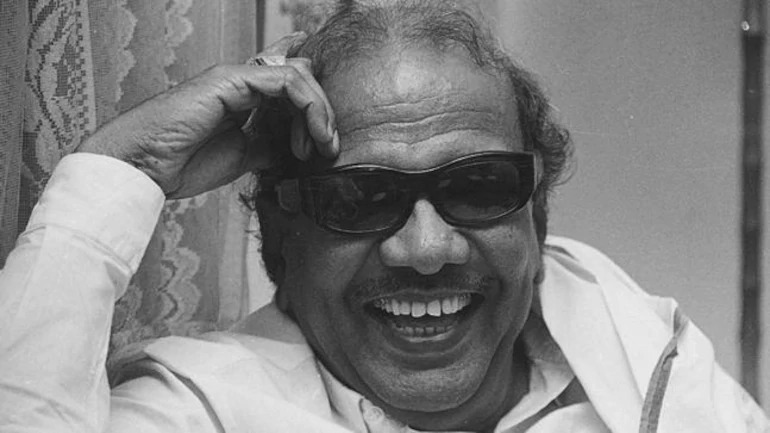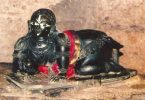Remembering Kalaignar on his 98th Birthday
Dr. Muthuvel Karunanidhi, a political genius and former Chief Minister of Tamil Nadu, was a rare gem not only for the people of the state, but across modern India.
He was an intellectual giant and a cultural phenomenon, who strode the modern world majestically with dazzling dynamism that at once won the admiration of all and the envy of many.
Being self-taught in Tamil language and the great Sangam literature, he chiselled himself over time to finally become an icon others looked up to – a man with varied talents, whose roots were deeply entrenched in Tamil language and literature.
It is no surprise that he is revered as ‘Kalaignar’ with love by millions all over the world.
He is a ‘master’s master’ in poetry, an orator unmatched.
He is so fluid in prose and a connoisseur of fine arts that the title of ‘Doctor of letters’ fits him so well.
The Tamil world thus naturally refers to him with respect, as Dr Kalaignar.
His rise is incomparable.
His poetry was fluent, fiery and fierce. Anyone who listened to his recitation of his lovely and lively poems in various literary and political meetings, seminars and conclaves, were transported to a state of joy and vibrancy.
His love and passion for Tamil and Tamil literature was more than evident when he took up the cause of Tamil not only in literary circles, but in the political stage too.
If not for Dr Kalaingar, Tamil would not have attained the classical language status that was its due. Today we enjoy the fruits of his continuous and sustained efforts.
Kalaignar was 29-years-old in 1953, when he was confined to rigorous imprisonment in Trichy prison.
It was at this time that he read Ilangovadigal’s ‘Silappadhikaram’, one of the five great classics of Tamil literature, with great passion.
He was so deeply impressed by the epic that he enthusiastically started quoting the chapter and verse from ‘Silapathikaram’, which became a regular feature in his public discourses and speeches.
Kalaignar’s interpretation of the historic ‘Silapathikaram’ in his own style, is the scholarly outcome of 15 long years of outstanding effort.

He published his magnum opus when he was the Public Works Minister of Tamil Nadu.
It was a work of such high quality and innovation that it attracted the then Chief Minister of Tamil Nadu, Peraringar Annadurai, known as ‘Anna’ to millions, to pen the preface with love.
Through the impact of ‘Silapathikaram’ Dr.Kalaingar endearingly called his mentor “Anna, Anna”, which is the term used by the prince-turned-monk, Ilango Adigal, to address his brother, the Chera King Senguttuvan.
Likewise, Dr Kalaingar used to address Rani Annadurai as Anni, which again was the term used by Ilango Adigal to address his sister-in-law, Devi.
Thousands of years ago, Cheran Elango, heir to the throne, forfeited power, turned ascetic and gave the world the great Epic ‘Silappadikaram’.
Mahakavi Bharathi was so impressed by the monk and his work that he wrote about it as ‘Nenjai Allum Silapathikaram (Silappathikaaram, the heart ennobling)’ – an epic that exalts the cordial and sublime feelings of human ethics and restraint.
When Mahakavi was so impressed with the epic, will Dr Kalaignar be left behind?
He penned the classic ‘Poompukaar’.
The play was an instant success and from it rose the long forgotten Megapolis in the minds of the Tamils and the dream of the author was achieved.
He not only brought back ‘Poompukaar’, he also gave the epic his own twist with some innovative interpretations of the Kovalan – Kannaki – Madhavi relationship triangle.
It was common in Universities abroad to adapt classics from other countries that reflected the culture of the land while translating and also nuanced the author’s interpretation.
Kalaignar too chose to give parts of the epic his own interpretation.
The fact that Dr Kalaignar chose ‘Silapathikaram’ and that too in the 1950s’ and 1960s’, speaks for his brilliance and foresight, showing how the classical work can be read in contemporary times.
No one will feel that the Drama of Kalaignar is an entirely adapted version of Elango Adigal’s epic.
The Drama itself seems to be the original version.
‘Silappathikaaram’ or ‘Poompuhar’, the drama written by Kalaignar, starts with ‘Elango’s Renunciation’ and ends with ‘Kadavul Mangalam’, an epilogue.
Kalaignar, in his drama, emphasizes that he agrees with the wisdom of the text, but not with the centrality given to ‘fate’ by the classical poet, as the underlying philosophical theme of ‘Silappathikaram’ is ‘Fate cannot be escaped’.
Kalaignar in his drama shows Elango despising ‘fate’ and reason in that sense before his father Cheralathan himself.
The dialogue of Elango that reads ‘Tamil Nadu will become a land of misery if we trust only fate and live accordingly’, is nothing but the voice of Kalaignar.
The marriage of Kovalan to Kannaki was not shown in Kalaignar’s ‘Silambu’.
Kannaki welcomes Kovalan at a beach, once he returns from Greece where he was running his business.
Both embrace each other as the waves do.
Kovalan is accompanied by a 68-year-old rich Greek merchant.
Out of the three literary forms of Tamil, the Greek merchant learnt prose and poetry from Kovalan.
The only form he was unaware of was, ‘drama’.
Kovalan, Kannaki, and the old Greek merchant go to watch Madhavi’s dance show… ‘Kooni’, a hunchbacked woman, who announces in the court that the one who is ready to buy 1008 ‘Kazhanchu’ of golden ornaments gifted by Chola King, can win the heart of Madhavi.
Madhavi was taken aback when the old Greek merchant came forward to buy the ornaments.
She is not ready to give that ‘Vasantha Malai’ to that Greek merchant.
Meanwhile, Kannaki insists that her husband, Kovalan, should save Madhavi and extolls, “Oh my dear! Please, You buy that golden ornament and save Madhavi”.
Being socially progressive, Kalaignar wanted to prevent the marriages of elderly men prevalent at that time and the character of the Greek merchant played a great role in this respect.
Elango Adigal has not narrated Kovalan as a good merchant, or a scholar, or a man with great virtues in his original epic.
But in Kalaignar’s play, we see Kovalan as an innocent man right from the beginning.
Likewise we see Kannaki as a ‘Modern Revolutionary Woman’ as perceived by Bharathiyar.
In the original epic, it has not been mentioned where and how the goldsmith stole the anklet.
But, Kalaignar narrates it in another way – that one of the anklets of Pandimadevi got damaged and it was the palace officer who took that anklet to the goldsmith for repair and stole it too.
This way Kalaignar has removed the wrong portrayal of Goldsmiths and erased the bad image they suffered from for ages.
Even the lovers’ tiff, he felt, should be resolved at home, not in the King’s court.
He defined ‘humbleness’ intricately and, in this way, Kalaingar gave a sublime twist to the epic.
The famous quote to describe the great poet Kambar, “The Poet-In-Chief who rendered the fame of Rama in mellifluous poems,” fitted equally to Kalaignar as well.
Since Kalaignar adapts the principle of Chaste Tamil, and also the spreading of Tamil is the need of the hour, we see the exemplary usage of Tamil in Kalaignar’s drama, which we couldn’t see in Elangovadigal’s original version.
Kalaignar also did not hold Kovalan responsible for the relationship with Madhavi.
Kalaignar’s literary skills also brought about a revolution in the film industry.
His dramatic dialogues lent a new light, not only to the stories from the past, it also created a new wave with social dramas.
The yesteryear superstars of Tamil celluloid world owe their success to the films celebrated for their powerful dialogues, rich in rhetoric and at times acerbic when taking on social ills or blind, superstitious beliefs.
A dialogue writer was noticed for the first time and was given the status of the hero of the movie!
His writings and political orientation were always rooted in analytical reason, Reformation, Politics of Social Equity of Periyar and Protection of the State’s Rights.
He never hesitated to take on anyone who opposed the values.
Tamils and Tamil language stood above all else for him.
No wonder he was a five-time Chief Minister of Tamil Nadu.
While this stands as a testimony to his political wizardry, the fact that he is in the heart of millions of Tamils, was more important to him than his political career!
Kalaignar’s 98th birthday on June 3, 2021, will be cherished and well remembered by the Tamils world over.
– Dr. Avvai Arul,
(For contact:- dr.n.arul@gmail.com)







Leave a Comment
You must be logged in to post a comment.